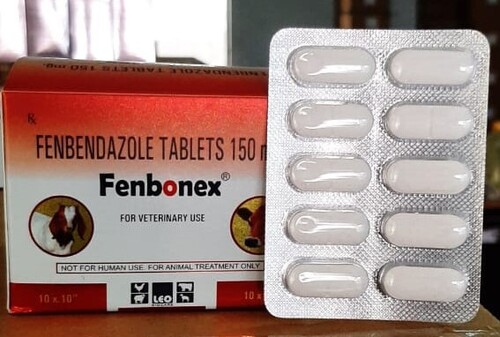The Detailed Dosage Guide for fenbendazole capsules for Safe Use
Understanding the Advantages and Uses of Fenbendazole in Vet Medicine
Fenbendazole has actually developed itself as a key anthelmintic in vet medicine. Its ability to target different parasitical infections makes it a valuable device for vets. The medication's system disrupts crucial mobile processes in parasites, leading to efficient treatment results. Nevertheless, its security account ranges types, requiring mindful consideration in its usage. Understanding these dynamics can clarify fenbendazole's more comprehensive ramifications in vet treatment and continuous research into its possible beyond conventional applications
Mechanism of Action of Fenbendazole

Common Parasitic Infections Treated With Fenbendazole
A variety of parasitic infections are effectively treated with fenbendazole, making it a versatile alternative in veterinary medicine. This anthelmintic representative is specifically effective versus nematodes, consisting of roundworms and hookworms, which typically impact pet dogs and pet cats. It is also utilized for the treatment of cestodes, such as tapeworms, supplying a wide range of activity versus both kinds of intestinal tract bloodsuckers. Additionally, fenbendazole is valuable in taking care of infections triggered by protozoa, particularly Giardia, which can cause stomach distress in animals. Its effectiveness includes treating certain lungworms in dogs and felines, attending to respiratory health concerns linked to these bloodsuckers. On the whole, fenbendazole's ability to target several parasitical species makes it a beneficial device in veterinary method, making certain the health and wellness and well-being of family pets influenced by these common infections.
Safety and Efficacy in Different Pet Variety
The safety and efficacy of fenbendazole vary amongst different animal varieties, underscoring the significance of species-specific factors to consider in vet medicine. In pooches, fenbendazole is normally well-tolerated and efficient against a variety of gastrointestinal parasites, including roundworms and hookworms. For felines, however, its usage is less typical and might require careful application because of potential adverse reactions.
In livestock, such as cattle and sheep, fenbendazole shows efficiency versus numerous endoparasites, contributing to enhanced health and efficiency. However, the pharmacokinetics and prospective negative effects can vary markedly in between species, demanding cautious evaluation by veterinarians.
Horses additionally react favorably to fenbendazole, specifically for dealing with strongyles and ascarids, though dose and management paths must be tailored to their distinct physiology. As a result, recognizing these distinctions is important for maximizing treatment outcomes and ensuring pet well-being across varied varieties.
Management and Dosage Standards
Proper administration and dosage standards are vital for making the most of the restorative results of fenbendazole while decreasing possible negative effects. The dosage generally differs depending upon the varieties being treated, the specific problem, and the formulation of fenbendazole utilized. fenbendazole 444. For canines and pet cats, a common dose is 50 mg/kg body weight, provided once daily for 3 consecutive days, but veterinarians may adjust this based on specific health assessments
It is necessary to provide fenbendazole with food to improve absorption and reduce stomach distress. The medication is offered in different kinds, including granules and paste, permitting for flexible administration choices. Keeping track of the pet's reaction during and after therapy is a good idea to confirm effectiveness and safety and security. Furthermore, vet support is important to establish the ideal duration of treatment based on the sort of parasitic infection being dealt with, ensuring excellent outcomes for the animal's health and wellness.
Future Viewpoints and Study on Fenbendazole
Study on fenbendazole remains to develop, concentrating on its prospective applications past standard antiparasitic uses. Current researches have discovered its effectiveness in dealing with various types of cancer cells, specifically in veterinary oncology. Initial data recommend that fenbendazole may inhibit the growth of tumor cells and boost the effects of various other chemotherapeutic representatives.
Moreover, researchers are examining its duty in handling food poisonings in animals, highlighting its anti-inflammatory properties. The versatility of fenbendazole for various species increases inquiries about its safety profiles and excellent application programs in diverse populaces.
As interest expands, there is a need for complete professional trials to establish evidence-based guidelines for these novel applications. Future research study might additionally investigate the mechanisms behind fenbendazole's results, possibly leading the way for ingenious therapeutic methods in vet medication. The recurring expedition of fenbendazole can considerably enhance treatment alternatives for numerous veterinary problems.

Frequently Asked Inquiries
Is Fenbendazole Safe for Pregnant Animals?
The safety of fenbendazole for expectant pets remains uncertain. While some studies recommend very little risk, veterinarians typically advise fenbendazole 444 caution and typically encourage against its usage throughout maternity unless the advantages clearly surpass possible threats.
Can Fenbendazole Be Made Use Of in Animals?
Fenbendazole is commonly made use of in animals to deal with numerous parasitical infections. 222 mg. Its efficiency versus gastrointestinal worms makes it a useful anthelmintic, contributing to enhanced wellness and efficiency in animals increased for food and fiber
What Are the Side Results of Fenbendazole?

The negative effects of fenbendazole might include gastrointestinal disturbances, lethargy, and sensitive responses. In rare instances, a lot more severe reactions might take place, necessitating careful surveillance and examination with a vet throughout therapy.
Just How Does Fenbendazole Compare to Other Dewormers?
Fenbendazole supplies broad-spectrum efficacy against various bloodsuckers, typically comparing favorably to various other dewormers. Its one-of-a-kind system targets different life phases, making it reliable, while generally offering a favorable safety and security account contrasted to alternatives readily available on the marketplace.
Can Fenbendazole Be Used for Treating Cancer in Pets?
The potential of fenbendazole in treating cancer in animals has garnered passion. Preliminary research studies suggest it might hinder cancer cells cell development, yet better research is essential to verify its efficacy and security in vet oncology.